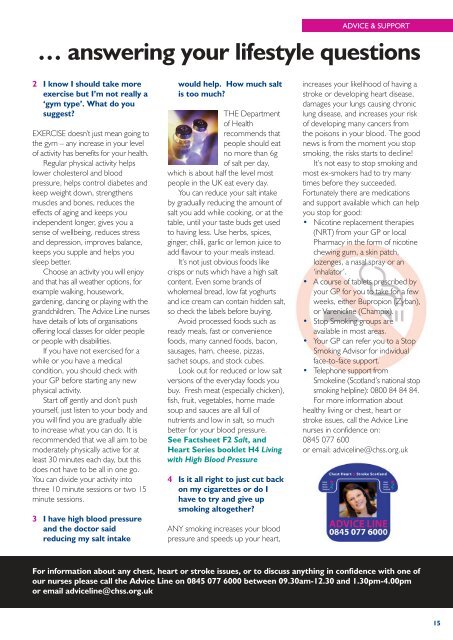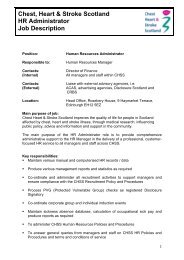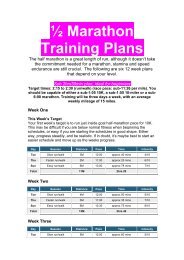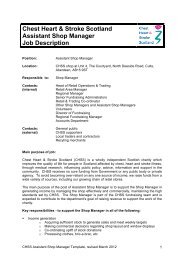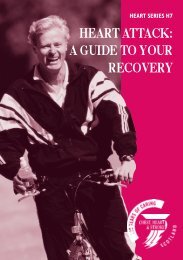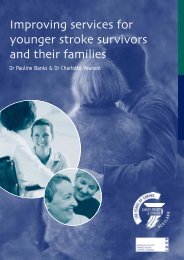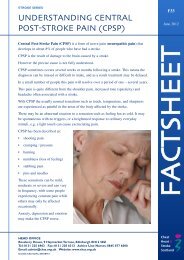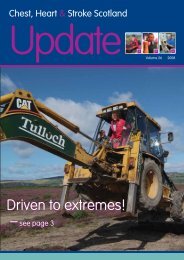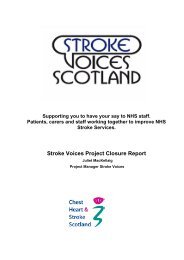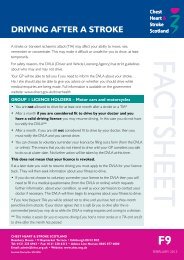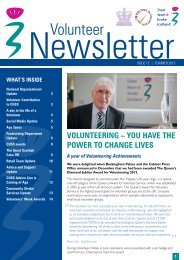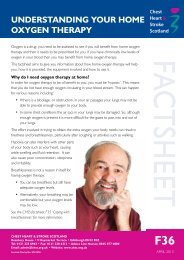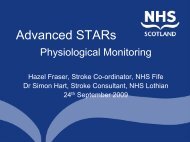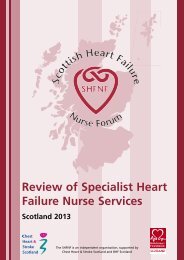Family matters - Chest Heart & Stroke Scotland
Family matters - Chest Heart & Stroke Scotland
Family matters - Chest Heart & Stroke Scotland
Create successful ePaper yourself
Turn your PDF publications into a flip-book with our unique Google optimized e-Paper software.
ADVICE & SUPPORT… answering your lifestyle questions2 I know I should take moreexercise but I’m not really a‘gym type’. What do yousuggest?EXERCISE doesn’t just mean going tothe gym – any increase in your levelof activity has benefits for your health.Regular physical activity helpslower cholesterol and bloodpressure, helps control diabetes andkeep weight down, strengthensmuscles and bones, reduces theeffects of aging and keeps youindependent longer, gives you asense of wellbeing, reduces stressand depression, improves balance,keeps you supple and helps yousleep better.Choose an activity you will enjoyand that has all weather options, forexample walking, housework,gardening, dancing or playing with thegrandchildren. The Advice Line nurseshave details of lots of organisationsoffering local classes for older peopleor people with disabilities.If you have not exercised for awhile or you have a medicalcondition, you should check withyour GP before starting any newphysical activity.Start off gently and don’t pushyourself, just listen to your body andyou will find you are gradually ableto increase what you can do. It isrecommended that we all aim to bemoderately physically active for atleast 30 minutes each day, but thisdoes not have to be all in one go.You can divide your activity intothree 10 minute sessions or two 15minute sessions.3 I have high blood pressureand the doctor saidreducing my salt intakewould help. How much saltis too much?THE Departmentof Healthrecommends thatpeople should eatno more than 6gof salt per day,which is about half the level mostpeople in the UK eat every day.You can reduce your salt intakeby gradually reducing the amount ofsalt you add while cooking, or at thetable, until your taste buds get usedto having less. Use herbs, spices,ginger, chilli, garlic or lemon juice toadd flavour to your meals instead.It’s not just obvious foods likecrisps or nuts which have a high saltcontent. Even some brands ofwholemeal bread, low fat yoghurtsand ice cream can contain hidden salt,so check the labels before buying.Avoid processed foods such asready meals, fast or conveniencefoods, many canned foods, bacon,sausages, ham, cheese, pizzas,sachet soups, and stock cubes.Look out for reduced or low saltversions of the everyday foods youbuy. Fresh meat (especially chicken),fish, fruit, vegetables, home madesoup and sauces are all full ofnutrients and low in salt, so muchbetter for your blood pressure.See Factsheet F2 Salt, and<strong>Heart</strong> Series booklet H4 Livingwith High Blood Pressure4 Is it all right to just cut backon my cigarettes or do Ihave to try and give upsmoking altogether?ANY smoking increases your bloodpressure and speeds up your heart,increases your likelihood of having astroke or developing heart disease,damages your lungs causing chroniclung disease, and increases your riskof developing many cancers fromthe poisons in your blood. The goodnews is from the moment you stopsmoking, the risks starts to decline!It’s not easy to stop smoking andmost ex-smokers had to try manytimes before they succeeded.Fortunately there are medicationsand support available which can helpyou stop for good:• Nicotine replacement therapies(NRT) from your GP or localPharmacy in the form of nicotinechewing gum, a skin patch,lozenges, a nasal spray or an‘inhalator’.• A course of tablets prescribed byyour GP for you to take for a fewweeks, either Bupropion (Zyban),or Varenicline (Champix).• Stop Smoking groups areavailable in most areas.• Your GP can refer you to a StopSmoking Advisor for individualface-to-face support.• Telephone support fromSmokeline (<strong>Scotland</strong>’s national stopsmoking helpline): 0800 84 84 84.For more information abouthealthy living or chest, heart orstroke issues, call the Advice Linenurses in confidence on:0845 077 600or email: adviceline@chss.org.ukFor information about any chest, heart or stroke issues, or to discuss anything in confidence with one ofour nurses please call the Advice Line on 0845 077 6000 between 09.30am-12.30 and 1.30pm-4.00pmor email adviceline@chss.org.uk15


